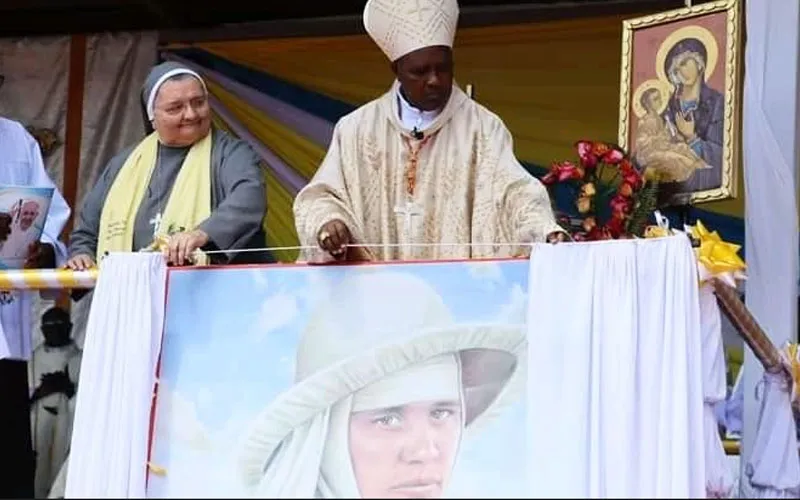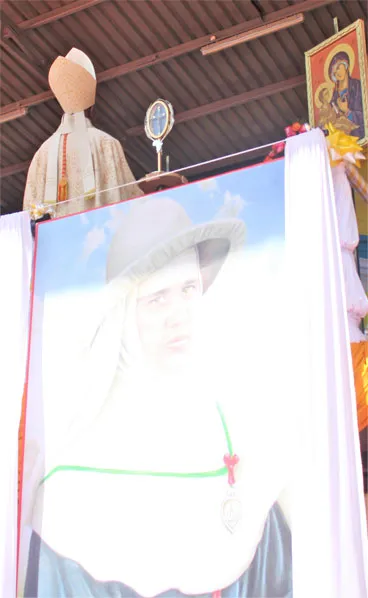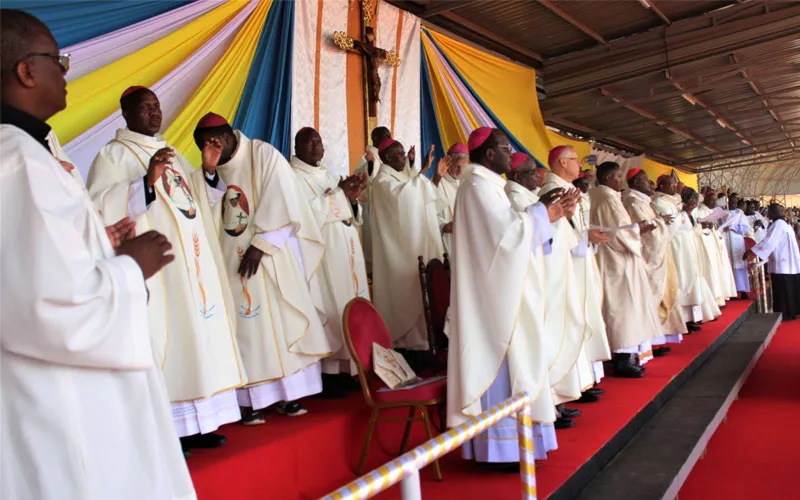“She had an absolute trust in the loving care of God and came in this land to be a witness to this so that we can also acquire the same faith and trust that frees us from all fear and calls to us to faithfulness to God,” he said during the ceremony that was graced by dignitaries, including the representative of the Holy Father in Kenya, Archbishop Hubertus van Megen, Bishop Salesius Mugambi of Meru Diocese, and the Italian ambassador to Kenya, Roberto Natali, among others.
The Cardinal who started his Episcopal Ministry in July 2013 as Bishop of Rwanda’s Kibungo Diocese called upon Christians to see in Blessed Carola an example of missionary zeal worth emulating.
“Sr. Carola gave us an example to follow in our lifetime; today is our turn to carry on this missionary life in our world today, which needs it most,” the Archbishop of Kigali said, adding, “She spent her life in this land giving great honor to God and to the Church.”
The family is one of the institutions where the example of Blessed Carola can be applied, he said, underscoring the need to free families from what he termed “fake love”.
Fake love, the Catholic Church leader who is the first-ever Rwandan Cardinal, named Cardinal in October 2020 said, “is the root cause of the problems in our families today because of the high favors expected from each other by the spouses.”
(Story continues below)
He advocated for true love in families following the selfless witness of Blessed Carola.
True love of the gospel when applied within the family should be based on “what good I am going to do for my husband, wife, parent, children, brothers and sisters in the community,” Cardinal Kambanda said, adding, “This is the testimony blessed Maria Carola gives us.”
The Cardinal turning 64 on November 10 went on to reflect on the sacrifices that early missionaries to Africa made, saying, “Many of them got sick on the way and others died young while on this journey.”
The November 5 beatification ceremony is the second such celebration on the Kenyan soil, after that of Sr. Irene Stefani (Nyaatha) in May 2015.
 Italian Ambassador to Kenya, (second from left) and some of Kenya's government officials at the beatification of Italian-born Sister Maria Carola at Kinoru Stadium covered by Kenya's Meru Diocese. Credit: ACI Africa.
Italian Ambassador to Kenya, (second from left) and some of Kenya's government officials at the beatification of Italian-born Sister Maria Carola at Kinoru Stadium covered by Kenya's Meru Diocese. Credit: ACI Africa.
Born Aurelia Mercede Stafani in August 1891, the Italian-born member of the Consolata Missionary Sisters was commissioned to Kenya after taking her first vows in January 1914; she arrived in the East African nation in January 1915.
She served in the military hospitals in Kenya and Tanzania during the First World War (1915-1918) where a medical colonel nicknamed her “angel of charity”. She died in Kenya in October 1930 after contracting a disease from a patient she was caring for. She was 39.
Pope Francis delegated Polycarp Cardinal Pengo, then Archbishop of Dar-es-Salaam in Tanzania, to preside over the beatification of Sr. Nyaatha on 23 May 2015 in Nyeri.
The miracle that opened the way for Sr. Nyaatha’s beatification happened in the Southern African nation of Mozambique where, in Nipepe Parish, Lichinga Diocese, 270 people hiding from the 1989 civil war invoked her name to get drinking water, which miraculously flowed and multiplied in the baptismal font.
Her sainthood journey has so far evolved through three successive Papal reigns: Pope St. John Paul II formally opened her sainthood cause by declaring her “Servant of God”; Pope Emeritus Benedict XVI declared her to have exhibited a life of heroic virtues and declared her “Venerable”.
Pope Francis approved a decree recognizing the Mozambique miracle thereby declaring Sr. Irene Stefani “Blessed”.
ACI Africa was founded in 2019. We provide free, up-to-the-minute news affecting the Catholic Church in Africa, giving particular emphasis to the words of the Holy Father and happenings of the Holy See, to any person with access to the internet. ACI Africa is proud to offer free access to its news items to Catholic dioceses, parishes, and websites, in order to increase awareness of the activities of the universal Church and to foster a sense of Catholic thought and culture in the life of every Catholic.




 Antoine Cardinal Kambanda of Rwanda after receiving a relic of Sr. Maria Carola during her beatification ceremony in Kenya's Meru diocese on Saturday, November 5. Credit: ACI Africa.
Antoine Cardinal Kambanda of Rwanda after receiving a relic of Sr. Maria Carola during her beatification ceremony in Kenya's Meru diocese on Saturday, November 5. Credit: ACI Africa. 
 Some Bishops at the Beatification ceremony of Sr. Maria Carola at Kinoru Stadium in Meru Diocese on 5 November 2022. Credit: ACI Africa
Some Bishops at the Beatification ceremony of Sr. Maria Carola at Kinoru Stadium in Meru Diocese on 5 November 2022. Credit: ACI Africa Italian Ambassador to Kenya, (second from left) and some of Kenya's government officials at the beatification of Italian-born Sister Maria Carola at Kinoru Stadium covered by Kenya's Meru Diocese. Credit: ACI Africa.
Italian Ambassador to Kenya, (second from left) and some of Kenya's government officials at the beatification of Italian-born Sister Maria Carola at Kinoru Stadium covered by Kenya's Meru Diocese. Credit: ACI Africa.


